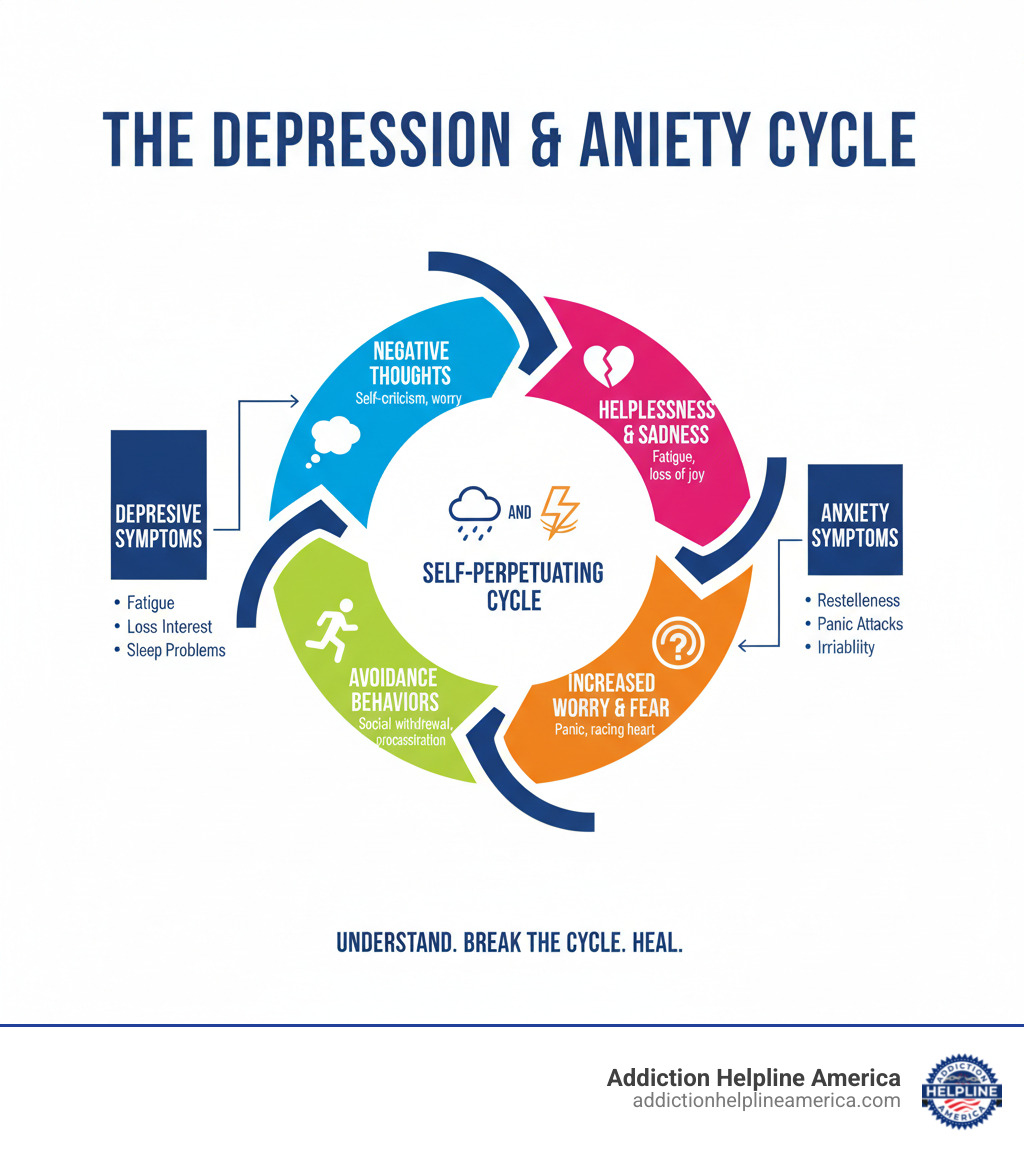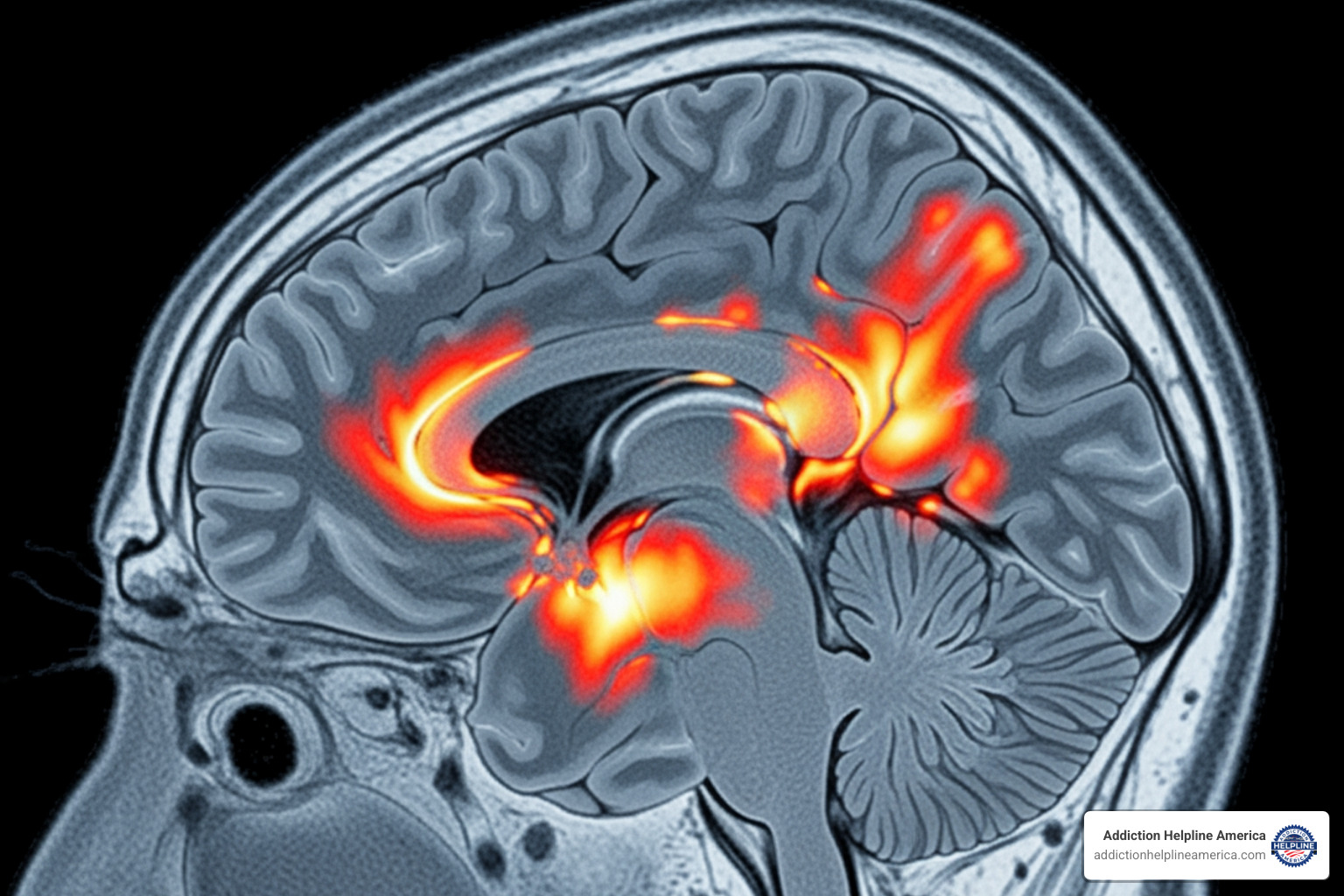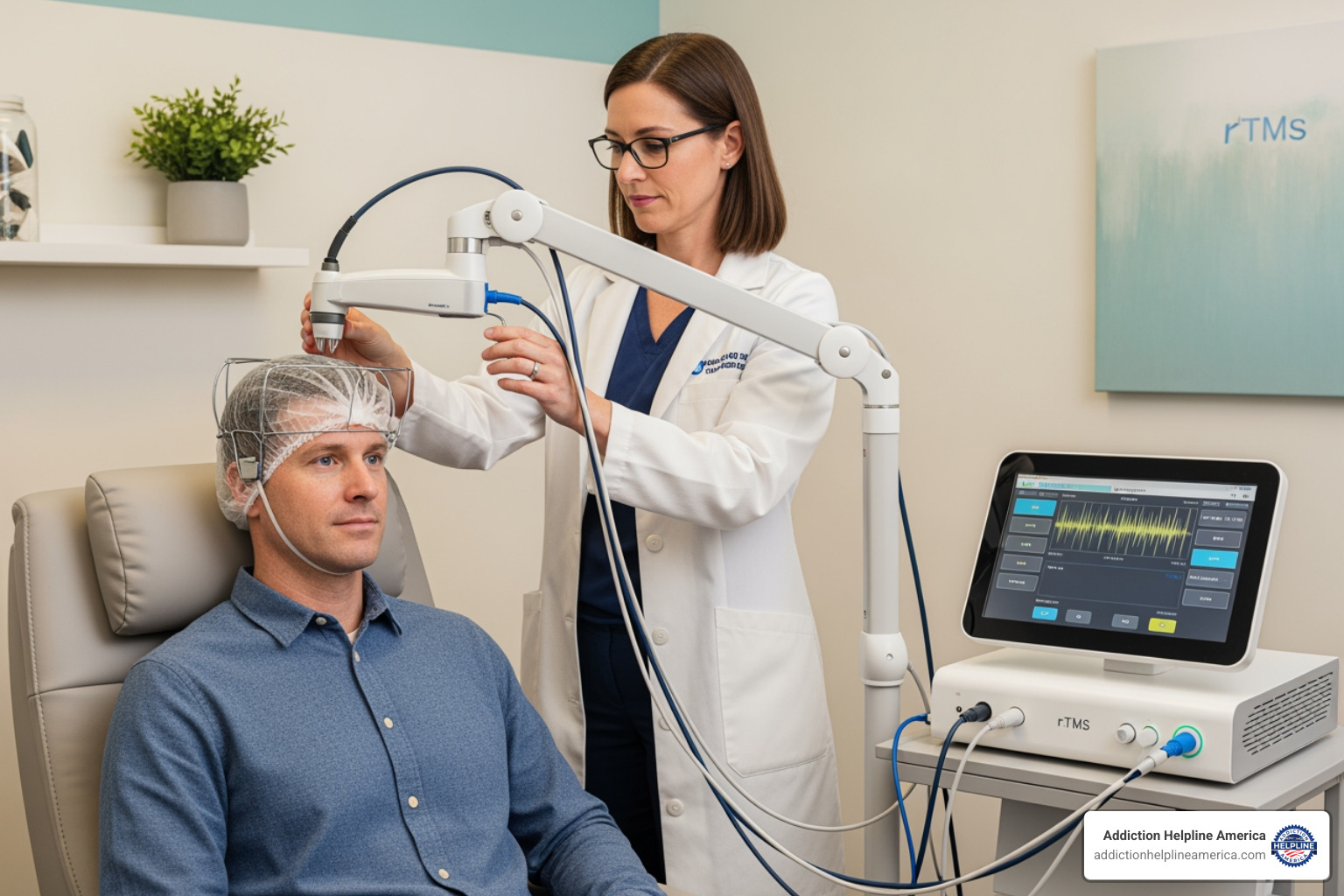
Why Seeking Help for Depression and Anxiety Changes Everything
Treatment for depression and anxiety is not only available—it works. If you’re struggling, here are your main options:
Primary Treatment Approaches:
- Psychotherapy – Talk therapy like Cognitive Behavioral Therapy (CBT) helps you build coping skills and change negative thought patterns.
- Medication – Antidepressants and anti-anxiety medications help rebalance brain chemistry.
- Lifestyle Changes – Exercise, sleep, and stress management techniques support recovery.
- Combined Treatment – Research shows the best results often come from combining therapy with medication and lifestyle changes.
Depression and anxiety often occur together, creating a cycle that feels impossible to break. This isn’t your fault, and you don’t have to face it alone. The good news is that effective treatments exist, and recovery is possible. Whether you’re dealing with persistent sadness, overwhelming worry, or panic attacks, help is available right now.
At Addiction Helpline America, we connect individuals and families with comprehensive treatment for depression and anxiety through our 24/7 helpline, treatment referrals, and support network connections. Our experienced team understands how mental health challenges and substance abuse often overlap, and we’re here to guide you toward the right resources for your unique situation.
Similar topics to treatment for depression and anxiety:
Understanding the Landscape of Depression and Anxiety
Depression and anxiety are two of the most common mental health conditions in the U.S., and they often appear together. Understanding what you’re dealing with is the first step toward getting the right treatment for depression and anxiety.
Common Symptoms to Watch For
Recognizing the signs is crucial, as these conditions impact your thoughts, body, and daily functioning.
Depression is more than just sadness. It’s a persistent heaviness with symptoms that can include:
- Loss of interest in activities you once enjoyed
- Significant changes in sleep or appetite
- Overwhelming fatigue
- Feelings of worthlessness or excessive guilt
- Difficulty concentrating
- In severe cases, thoughts of suicide, which require immediate help. You can reach the National Suicide Prevention Lifeline 24/7.
Anxiety involves excessive, uncontrollable worry. It often manifests as:
- Restlessness or feeling on-edge
- Chronic muscle tension
- Fatigue from being in a constant state of alertness
- Frightening panic attacks—sudden episodes of intense fear with physical symptoms like a racing heart and shortness of breath.
Because these conditions frequently occur together, a comprehensive treatment approach that addresses both is essential.
The Different Types of Anxiety Disorders
Anxiety is an umbrella term for several distinct disorders:
- Generalized Anxiety Disorder (GAD): Chronic, excessive worry about everyday things, accompanied by physical symptoms.
- Panic Disorder: Recurrent, unexpected panic attacks and the persistent fear of having more.
- Social Anxiety Disorder: An intense fear of being judged or embarrassed in social situations.
- Specific Phobias: An irrational fear of a specific object or situation, like heights or flying.
- Agoraphobia: Anxiety about being in places where escape might be difficult if panic symptoms arise.
For more details, the National Institute of Mental Health offers resources on What Are Anxiety Disorders?
Potential Causes and Risk Factors
Depression and anxiety rarely have a single cause. They typically result from a complex mix of factors:
- Genetics: A family history of these conditions can increase your risk.
- Brain Chemistry: Imbalances in neurotransmitters that regulate mood are a key factor.
- Life Events: Chronic stress, significant loss, trauma, or major life changes can act as triggers.
- Trauma: Past trauma, especially in childhood, significantly increases risk.
- Chronic Illness: The stress of managing a chronic physical illness often leads to depression or anxiety.
- Substance Use: Many people use drugs or alcohol to cope, creating a vicious cycle that worsens both addiction and mental health. Learn more about addiction risk factors.
Understanding these factors helps explain why comprehensive treatment for depression and anxiety is so effective.
The Path to Diagnosis and Seeking Help
Taking the first step toward treatment for depression and anxiety begins with acknowledging that you need support. This moment of recognition is an act of courage.
How Are Depression and Anxiety Diagnosed?
Diagnosis is a multi-step process. It typically starts with a physical exam and lab tests to rule out medical conditions, like thyroid problems, that can mimic symptoms. The core of the diagnosis is a psychological evaluation with a mental health professional (a psychiatrist, psychologist, or licensed therapist).
During the evaluation, they will ask about your symptoms, personal history, and how your life is being affected. Professionals use the criteria in the Diagnostic and Statistical Manual of Mental Disorders (DSM-5) to ensure an accurate diagnosis. This is crucial for creating an effective treatment plan that points toward the right treatment for depression and anxiety for your specific situation.
When to Seek Professional Help
It can be hard to know if you’re just in a rough patch or if you need professional help. It’s time to reach out when:
- Symptoms interfere with your daily life, work, or relationships.
- Your mood is consistently worsening or not improving over time.
- Your usual coping strategies are no longer effective.
- You experience unexplained physical symptoms like chronic fatigue or digestive issues.
- You find yourself using alcohol or drugs to cope with your feelings.
- You have any thoughts of harming yourself or suicide. This is a medical emergency. Reach out to the National Suicide Prevention Lifeline at 988 immediately.
Asking for help is a sign of strength. At Addiction Helpline America, we understand that this first step can be intimidating, and we’re here to make the path to treatment as clear and supportive as possible.
Comprehensive Treatment for Depression and Anxiety
Once a diagnosis is made, a personalized treatment for depression and anxiety plan can be developed. This often involves a combination of therapies, medications, and lifestyle adjustments custom to your specific needs.
Psychotherapy: Building Coping Skills
Psychotherapy, or “talk therapy,” is a cornerstone of treatment. It equips you with lifelong tools to manage your mental health. Common approaches include:
- Cognitive Behavioral Therapy (CBT): A highly effective therapy that helps you identify and change negative thought patterns and behaviors.
- Exposure Therapy: Particularly useful for anxiety, this involves gradually and safely confronting feared situations to reduce the anxiety response.
- Interpersonal Therapy (IPT): Focuses on improving relationships and social functioning to alleviate depressive symptoms.
Finding a therapist you feel comfortable with is a key part of the process. For more information, see our page on treatment options.
Medication: A Tool for Rebalancing the Brain
For many, medication is a vital tool that helps restore chemical balance in the brain, making therapy and lifestyle changes more effective.
- Antidepressants: SSRIs (like Prozac or Zoloft) and SNRIs (like Cymbalta) are commonly prescribed for both depression and anxiety. They can take 4-8 weeks to become fully effective.
- Anti-anxiety Medications: Benzodiazepines (like Xanax) provide fast-acting relief but are typically for short-term use due to dependence risk. Buspirone is a non-addictive option for long-term anxiety management.
Medication should always be prescribed and monitored by a medical professional. Combining medication with psychotherapy often yields the best outcomes for treatment for depression and anxiety. Explore our resources on medication in treatment for more details.
The Surprising Link Between Smoking and Mental Health
There’s a strong, often overlooked link between smoking and mental health. While many people smoke to cope with stress, nicotine dependence actually worsens anxiety and depression over time. In fact, 3 in 10 cigarettes smoked in the U.S. are by people with mental health conditions.
The good news is that quitting smoking can significantly improve mental well-being. Research published in the BMJ on smoking cessation and mental illness found that the mental health benefits of quitting can be comparable to those of antidepressant treatment. If you smoke, quitting can be a powerful part of your recovery. Resources like Smokefree.gov quitting resources can help.
Advanced and Alternative Treatment Strategies
If traditional therapy and medication aren’t providing enough relief, don’t lose hope. Several advanced options exist for treatment for depression and anxiety that hasn’t responded to first-line approaches.
Navigating Treatment-Resistant Depression
When depression doesn’t improve after trying at least two different antidepressants, it’s known as Treatment-Resistant Depression (TRD). This isn’t a dead end; it’s a sign that a different approach is needed. Strategies include switching medications, adding a second medication to boost effectiveness (augmentation), or pursuing a combination of therapies.
Innovative Treatment for Depression and Anxiety
For more severe or treatment-resistant cases, several advanced medical treatments can make a profound difference.
- Electroconvulsive Therapy (ECT): Modern ECT is a safe and highly effective procedure for severe depression, performed under general anesthesia.
- Repetitive Transcranial Magnetic Stimulation (rTMS): This is a non-invasive treatment that uses magnetic pulses to stimulate mood-regulating areas of the brain. It’s an alternative for those who don’t respond to or can’t tolerate medication.
- Vagus Nerve Stimulation (VNS): An implanted device sends mild electrical pulses to the vagus nerve, influencing brain areas involved in mood. It’s a long-term option for treatment-resistant cases.
- Ketamine Therapy: Given in a clinical setting, ketamine can provide rapid relief from severe depression, sometimes within hours. It works differently from traditional antidepressants and is a promising option for those in crisis.
These advanced options represent real hope for individuals who have struggled to find relief. Addiction Helpline America can help connect you with specialists who offer these innovative treatments.
Daily Management and Long-Term Wellness
Professional treatment for depression and anxiety is essential, but daily self-care habits are just as important for long-term recovery. Think of therapy and medication as the tools, and your daily choices as how you use them.
How to Manage Anxiety and Depression in Daily Life
Building healthy habits can make a significant difference in managing symptoms between appointments.
- Stress Management: Use techniques like mindfulness, meditation, and simple breathing exercises to calm your nervous system. The Cleveland Clinic offers practical mindfulness techniques to get started.
- Regular Exercise: Physical activity releases mood-boosting endorphins. Even a 30-minute daily walk can improve depression and anxiety symptoms.
- Balanced Diet: A diet rich in fruits, vegetables, and lean proteins supports brain health. Limit caffeine and processed foods, which can worsen anxiety and mood.
- Sleep Hygiene: Prioritize consistent, quality sleep. Create a calming bedtime routine and keep your bedroom cool, dark, and screen-free.
- Social Connection: Connect with supportive friends, family, or support groups. Isolation worsens symptoms. Our family support resources can help loved ones learn how to provide effective support.
These practices don’t replace professional treatment—they improve it, giving you agency in your own healing.
The Risks of Leaving Depression and Anxiety Untreated
Ignoring depression and anxiety can have serious consequences, as these conditions rarely improve on their own and often become more severe.
- Worsening Symptoms: What starts as manageable can grow to take over your life.
- Reduced Quality of Life: Relationships, work performance, and physical health can all decline.
- Increased Substance Abuse Risk: Many people turn to alcohol or drugs to self-medicate, leading to a co-occurring addiction. This is a common issue we address in our resources on alcohol-related issues.
- Suicide Risk: Untreated depression is a leading cause of suicide. If you or someone you know is in crisis, call or text 988 to reach the National Suicide Prevention Lifeline immediately.
Seeking treatment for depression and anxiety is about protecting your health, your relationships, and your future.
Conclusion
Depression and anxiety are real, treatable medical conditions. Recovery is not only possible but expected with the right support. Effective treatment for depression and anxiety often combines psychotherapy, medication, and lifestyle changes custom to your unique needs. For those with treatment-resistant symptoms, advanced options like rTMS and ketamine therapy offer new hope.
The most important step is the first one: reaching out for help. Ignoring symptoms can lead to worsening health, strained relationships, and an increased risk of substance abuse.
At Addiction Helpline America, we make that first step easier. Our 24/7 helpline provides free, confidential guidance to connect you with the right treatment centers and mental health resources. You don’t have to steer this alone. Our team is here to help you find a path to recovery.
Recovery is possible. You deserve to feel better. Help is just a phone call away.
Our helpline is 100%
free & confidential
If you or someone you care about is struggling with drug or alcohol addiction, we can help you explore your recovery options. Don’t face this challenge alone—seek support from us.
Programs
Resources
Will my insurance
cover addiction
treatment?
We're ready to help
Find the best
drug or alcohol treatment
center
Are you or a loved one struggling with addiction? Call today to speak to a treatment expert.







